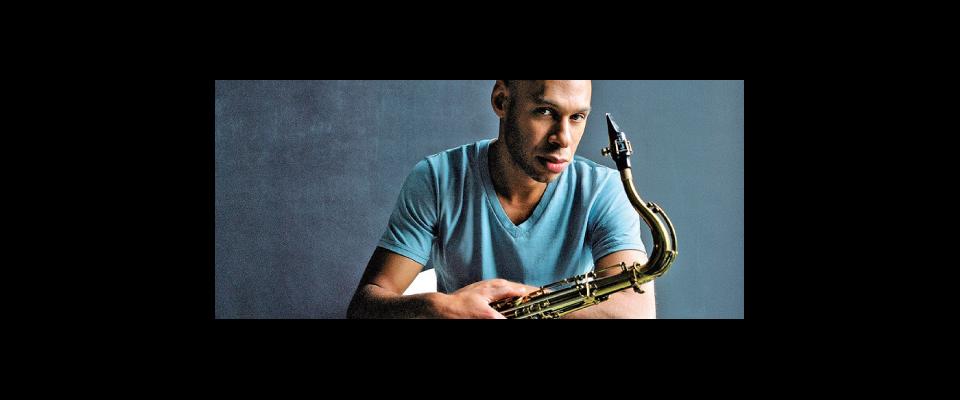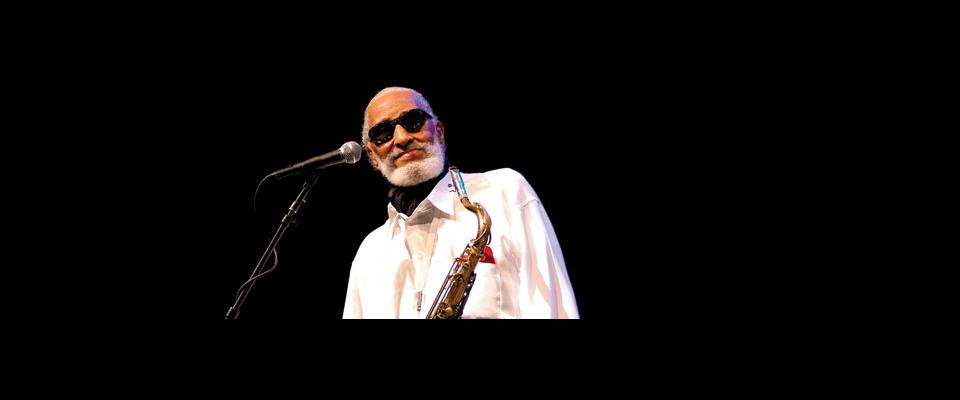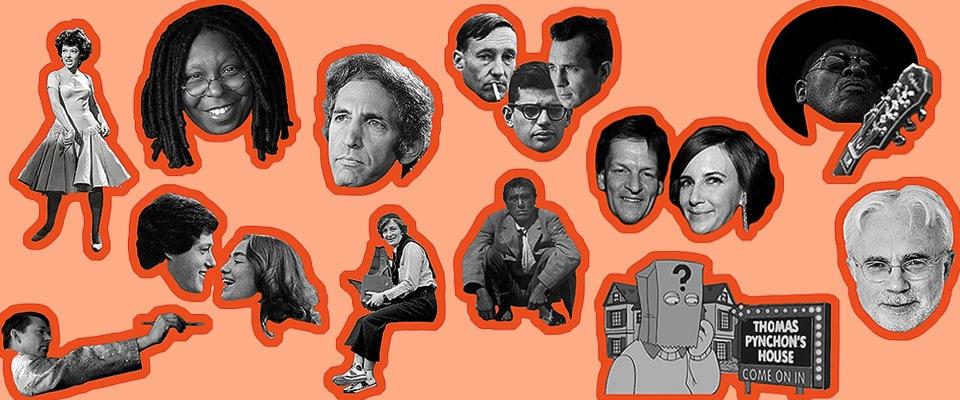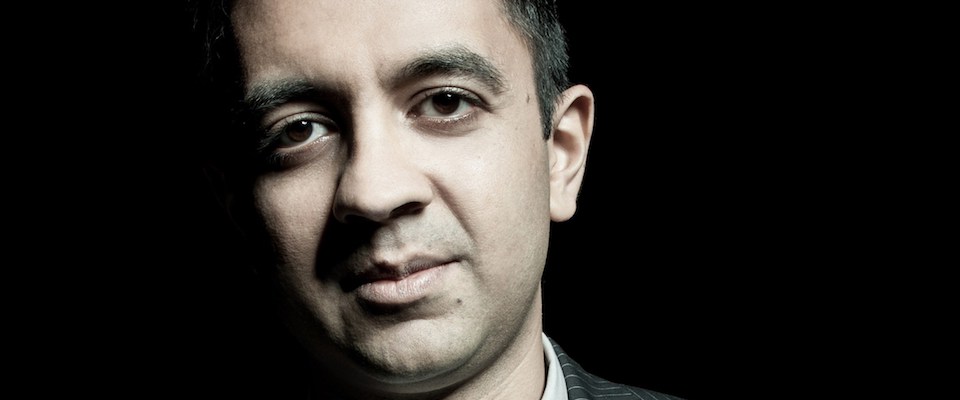Joshua Redman at home in Berkeley.
Joshua Redman is a living refutation of Thomas Wolfe’s oft-repeated truism that you can’t go home again. After a decade of fame and musical adventures in the Big Apple, the Berkeley-raised saxophonist returned to the East Bay, where he’s continued to flourish on and off the bandstand.
Even in the middle of a sunny summer afternoon, Redman looks the part of a jazz musician, with sleekly shaved head and the compact physique of a runner. But as a self-described homebody who spends much of his time in town schlepping his five-year-old son Jadon to activities and caring for his baby daughter, Avrah, Redman’s lifestyle is in tune with the family-friendly East Bay. There are things he misses about New York, but he has seamlessly re-integrated into the Berkeley zone, quickly sussing out the best spots around town for espresso.
“Berkeley seems a lot less edgy than it was when I was growing up, but maybe I’m just less edgy,” says Redman, 41, leaning forward on a well-worn upholstered chair in the West Berkeley café Local 123. “Caffeine is one of the few vices I still allow myself. I’m a gym rat, more for my mind than my body. I work out 30 minutes every day, and I have a really hard time taking a day off. On the road, it’s the same. I’m kind of neurotic about it. That’s my hang.”
Since giving up his gig as artistic director of SFJAZZ’s Spring Season concert series in 2007, Redman spends most of his life as a performer on the road with an array of ensembles. He doesn’t look like a man who’s keeping five plates spinning in the air, but he takes a deep breath before rattling off the various bands and projects keeping him busy these days. There’s his harmonically unfettered, stripped-down bass-and-drums trio featuring a revolving cast of superlative rhythm sections. And his unlikely double trio, a lineup with two bassists and two drummers that he introduced on his acclaimed 2009 Nonesuch album Compass. He’s now turned this group into a working band for European tours. Stateside, he’s been on the road with James Farm, an indie rock–inspired jazz quartet. And he’s performing widely in a duo with pianist Brad Mehldau.
For his hometown Cal Performances gig at Zellerbach Hall on Saturday, January 22, Redman has assembled a fascinating cast of players who share deep ties. The lineup includes New Orleans bassist Reginald Veal, best known for his long association with Wynton Marsalis; pianist Aaron Goldberg, a supremely fluent improviser with an abiding passion for Brazilian music; and powerhouse drummer Greg Hutchinson, who’s played a key role in just about every phase of Redman’s career.
“Hutch plays so beautifully, he’s the perfect foil for Josh, because it’s always nice to be able to play with musicians who don’t necessarily think exactly like you,” says Branford Marsalis, who served on the panel that awarded Redman top honors at the 1991 Thelonious Monk International Jazz Saxophone Competition. “There’s a certain kind of aggression Hutch has playing with Josh. He has this roar.”
Though Redman’s rise as one of jazz’s most visible artists was vertiginous, he didn’t buy into the hype hailing him as the “next great tenor saxophonist.” He arrived in New York City in 1991 as the hottest young player, fresh from his Monk Competition triumph—a Harvard graduate who turned down Yale Law School to try his luck on the Gotham jazz scene. The Village Voice’s Gary Giddins, one of Redman’s earliest champions, compared his emergence to another Berkeley-raised saxophonist who rocketed to renown. Giddins wrote in 1993, “Not since David Murray’s debut 18 years ago has a tenor saxophonist filled a role I didn’t know was lacking, the absence of which now seems unimaginable.”
Besides the preternatural maturity of his solos, what set Redman apart from so many of his peers was his lineage. As the son of legendary tenor saxophonist Dewey Redman, Joshua arrived surrounded by preconceptions of what he should sound like. Many jazz musicians have followed in a father’s footsteps, but as a child Joshua spent little time with Dewey. Jazz provided an avenue through which they forged a relationship, particularly after Joshua started touring and recording with his father in 1992.
“It was a very unique relationship,” says Redman, who was raised by his mother, dancer and librarian Renee Shedroff. “I didn’t grow up with him, and we went through periods when we were speaking a lot, and periods when we weren’t speaking a lot. Periods when I think we both felt very close, and periods when we didn’t.”
The timing might be coincidental, or simply the result of mid-career maturity, but since his father’s death in 2006 at the age of 75, Redman’s music has attained a new level of scorching creative intensity, starting with 2007’s stellar Nonesuch release Back East. Inspired by Sonny Rollins’s 1957 album Way Out West, Redman’s album explores music from a Berkeley-centric Pacific Rim perspective. As a child he soaked up sounds from various Eastern traditions, particularly South Indian Carnatic drumming and Balinese gamelan, and Asian influences are clearly there in the two tunes indelibly linked to Rollins: “I’m An Old Cowhand” and “Wagon Wheels.”
Since Redman has focused on the spare bass and drums setting, he’s attained a new level of eloquence on the soprano saxophone, a difficult horn with unsteady pitch in all but the most skilled hands. “I don’t want to say I feel comfortable, because it’s still in many ways unforgiving,” Redman says. “But I feel more and more that it’s a legitimate voice, where before it was an effect: ‘OK, I’ve got an Eastern-sounding tune; I can bring out the snaky soprano.’ Now I feel like it’s becoming more of a real voice for me.”
Always on the lookout for fresh challenges, Redman accepted an invitation from acclaimed Israeli composer Avner Dorman to premiere Dorman’s new concerto for soprano saxophone in October 2010 with the Alabama Symphony Orchestra. With little experience playing contemporary classical music, Redman wasn’t sure what he was getting into. And when he received the score, he realized it required extreme technical command and thus an unprecedented regimen of practice.
“I’ve got two months, and I’m still just working on getting the notes down, and I’m not even anywhere near trying to be musical or thinking about interpretation,” Redman says. “With jazz, that’s never been an issue—not because I can execute anything, but because precision in jazz doesn’t really matter to me. What matters is that you have an original idea. If you have a good idea, even if you can’t execute it, sometimes you can find a way to make that nonexecution work. Some of my best work has come from failure.”





















